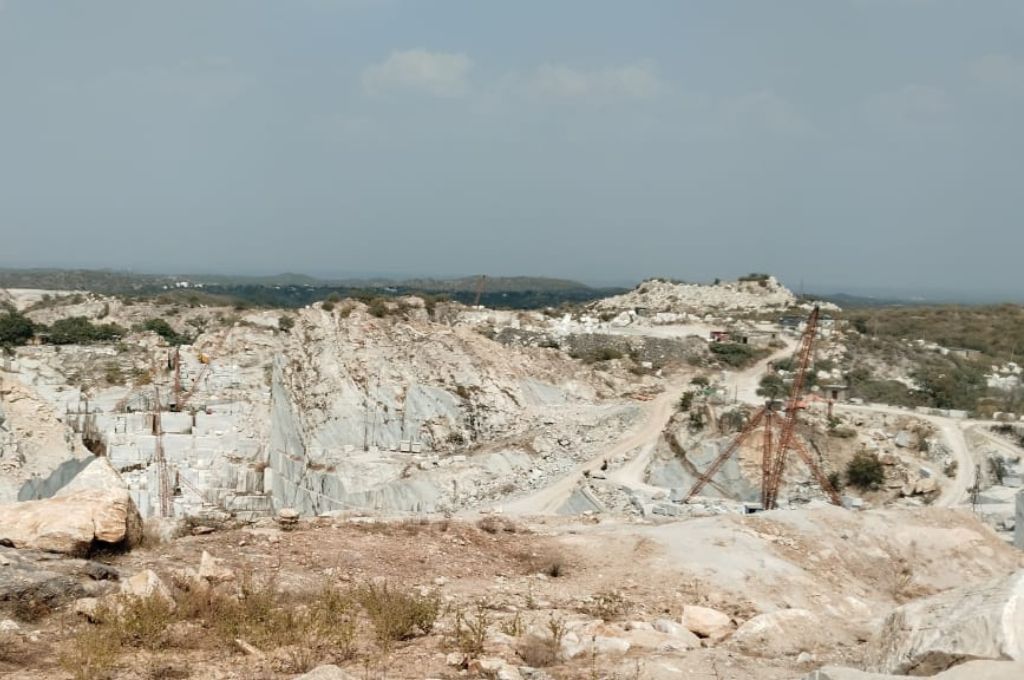રાજસ્થાનનું એક ગામ ખાણ માફિયાઓને હાંકી કાઢવા માટે એક અનોખી રીત અપનાવે છે

રાજસ્થાનના રાજસમંદ જિલ્લામાં આવેલું રાજવા ગામ અરવલ્લીની ટેકરીઓમાં આવેલું છે . આ ગામના રહેવાસીઓ પાસે ખેતી માટે મર્યાદિત જમીન છે, જેના કારણે ઘણા લોકોને રોજગારની તકો મેળવવા માટે બીજા રાજ્યોમાં સ્થળાંતર કરવાની અથવા જીવનનિર્વાહ માટે પશુપાલન પર આધાર રાખવાની ફરજ પડે છે. મહિલાઓ મુખ્યત્વે મનરેગા હેઠળ આપવામાં આવતા કામમાં જોડાય છે.
2014 થી રાજવામાં ખાણ માફિયાઓ સક્રિય છે. તેમણે આરસપહાણથી ભરપૂર જમીનનો મોટો હિસ્સો હસ્તગત કર્યો છે, ઘણીવાર જમીન સંબંધિત કાયદાઓનું ઉલ્લંઘન કરીને તેઓ ગ્રામજનો પાસેથી આ જમીનો અંગત ધોરણે ખરીદે છે અથવા ભાડાપટ્ટે મેળવે છે. પહેલાં આ જમીનના પટ્ટા ગોચરના મેદાનો હતા. હાલ આ પ્રદેશમાં આરસપહાણની પાંચ સક્રિય ખાણો છે, જે બધું મળીને આશરે 4 કિલોમીટર લાંબી અને 500 મીટર પહોળી છે. ખાણ માફિયાઓનો પ્રભાવ એટલો ઊંડો છે કે આ જમીનો પર પોતાના પશુધન ચરાવવાનો પ્રયાસ કરતા લોકોને પોલીસમાં લઈ જવાની ધમકી આપવામાં આવે છે.
જેમની જમીન પર આરસપહાણ હતો તેઓએ પોતાની આર્થિક જરૂરિયાતો પૂરી કરવા અને દેવા ચૂકવવા માટે તે જમીનો વેચવાનું શરૂ કર્યું હતું. પરિણામે ગામની અડધાથી વધુ ગોચર જમીન પર હવે ખાણકામ થઈ રહ્યું છે. એક સમયે જે જમીનનો ઉપયોગ – પશુધન ચરાવવા, મનરેગાના કામો માટે અને લાકડા એકઠા કરવા જેવા – વિવિધ હેતુઓ માટે થતો હતો તે જમીન ધીમે ધીમે ખાણકામના મોટા અને ઊંડા ખાડાઓમાં ફેરવાઈ ગઈ છે.
આવી મુશ્કેલ પરિસ્થિતિ ઊભી થતા રાજવાનો એક કસ્બો ધોરા, જ્યાં આ વિસ્તારની સૌથી પહેલી ખાણ કાર્યરત થઈ હતી, ત્યાંના લોકોએ નવી શરૂ થયેલી ખાણ બંધ કરવાની પહેલ કરી. જે લોકોએ પોતાની જમીન વેચી દીધી હતી તેમને પણ પોતાની ભૂલનો અહેસાસ થયો અને તેમણે તે જમીન પાછી મેળવવા માટે ગામના બાકીના લોકો પાસેથી મદદ માંગી. પરંતુ ખાણ માલિકો પાસે 60 વર્ષ માટેનો ભાડાપટ્ટો હોવાથી તેઓને વહીવટીતંત્ર તરફથી કોઈ મદદ મળી શકી નહીં.
આ પરિસ્થિતિનો સામનો કરવા માટે બીજો કોઈ ઉકેલ ન મળ્યો ત્યારે લોકોએ નવા ઉકેલો શોધવાનું વિચારવું પડ્યું. ખાણકામના સ્થળે લોક દેવતાને સમર્પિત એક મંદિર હતું, મોટાભાગના ગામલોકો તે દેવતાની પૂજા દ્વારા કરતા હતા. ગામલોકોએ એક થઈને તેમના ભગવાનના નામે શાંતિપૂર્ણ રીતે, તોડફોડ અને હિંસાનો આશરો લીધા વિના જમીનનું રક્ષણ કરવા માટે વિરોધ કરવાનો નિર્ણય લીધો. ધોરાના રહેવાસીઓએ – બેગ, બિસ્તરા અને ઘેટાં, બકરા, ગાય અને ભેંસ જેવા પશુધન સહિતનો – પોતાનો સામાન પેક કરી, સાથે લઈને આખો દિવસ તે જમીન પર કબજો કરવાનું નક્કી કર્યું. લગભગ 150 લોકો દરરોજ તે જમીન પર બેસી રહેવા લાગ્યા, પરિણામે ખાણકામની કામગીરી અટકી પડી.
મહિલાઓએ એક ડગલું આગળ વધીને પર્યાવરણને એવી રીતે બચાવવાનું નક્કી કર્યું કે જે સમુદાયમાં અભિવ્યક્તિનો એક કાયદેસરનો માર્ગ છે, જો કે બીજા લોકો તેને અંધશ્રદ્ધા ગણી શકે છે. સ્થાનિક રીતે ભાવ તરીકે ઓળખાતી આ અનોખી પદ્ધતિમાં લોકો તેમના શરીરમાં વસતા પ્રેતાત્મા અથવા દૈવી શક્તિની લાગણીઓ વ્યક્ત કરે છે, વ્યક્તિના શરીરનો કબજો કોઈ દૈવી શક્તિએ લીધો હોય ત્યારે વ્યક્તિ આવું વર્તન કરે છે. ખાણકામ કંપનીને હાંકી કાઢવાની વ્યૂહરચના તરીકે સ્થાનિક મહિલાઓએ તેમને ભાવ આવતો હોય તેવો ડોળ કર્યો. એવું લાગતું હતું કે કોઈ દૈવી શક્તિ તેમનો એક ભાગ બની ગઈ છે, જેના કારણે – ડોલવું, મંત્રોચ્ચાર કરવો, જમીન પર આળોટવું અને પ્રેતાત્મા, દેવતા અથવા માતા (દેવીમાં) સાથે વાતો કરવી જેવી – ભારે ભાવનાત્મક અને શારીરિક પ્રતિક્રિયાઓ થઈ રહી છે. વિરોધ પ્રદર્શન દરમિયાન અગાઉ તે જ જમીન પર મનરેગા કામમાં રોકાયેલી 30-40 મહિલાઓ આ વિરોધ પ્રદર્શનમાં જોડાઈ ગઈ. તેઓએ દસ-દસ લોકોના જૂથો બનાવીને ભાવ આવતો હોય એવો ડોળ કર્યો. દરમિયાન સામાન્ય રીતે મહિલાઓ દ્વારા હાથ ધરવામાં આવતા ઘરના કામોની જવાબદારી પુરુષોએ સ્વીકારી.
આ ક્રમ એક મહિના સુધી ચાલ્યો. જ્યારે ખાણ માલિકોને ખ્યાલ આવ્યો કે સ્થાનિક લોકો હાર માનવાના નથી, ત્યારે તેમને ડર લાગવા લાગ્યો કે બીજા ગામોના લોકો પણ આ વિરોધ પ્રદર્શનમાંથી પ્રેરણા લેશે અને તે વિસ્તારોમાંથી ખાણકામ કંપનીઓને દૂર કરવાનો પ્રયાસ કરશે, તેથી તેમણે તે જગ્યા ખાલી કરી દીધી. તે ખાણ છેલ્લા બે વર્ષથી કાર્યરત નથી. પરંતુ આ વિસ્તારમાં હજી પણ બીજી ચાર ખાણો કાર્યરત છે, અને વધુ પડતા ખોદકામને કારણે પર્યાવરણનો વિનાશ થઈ રહ્યો છે.
ઈશ્વર સિંહ એક સાંસ્કૃતિક અને સામાજિક કાર્યકર છે, તેઓ શ્રમ અને શિક્ષણની સમસ્યાઓ પર કામ કરે છે.
ટ્રાન્સલેશન ટૂલનો ઉપયોગ કરીને અંગ્રેજીમાંથી અનુવાદિત કરવામાં આવેલ આ લેખની સમીક્ષા અને તેનું સંપાદન મૈત્રેયી યાજ્ઞિક/આકાશ પરમાર દ્વારા કરવામાં આવેલ છે.
—
વધુ જાણો: ગુજરાતના છોટાઉદેપુર જિલ્લામાં રેતી ખનનની અસર વિશે વધુ જાણો.
વધુ કરો: આ લેખકના કામ વિશે વધુ જાણવા અને અને તેમના કામને તમારું સમર્થન આપવા mkssishwar@gmail.com પર તેમનો સંપર્ક સાધો.



